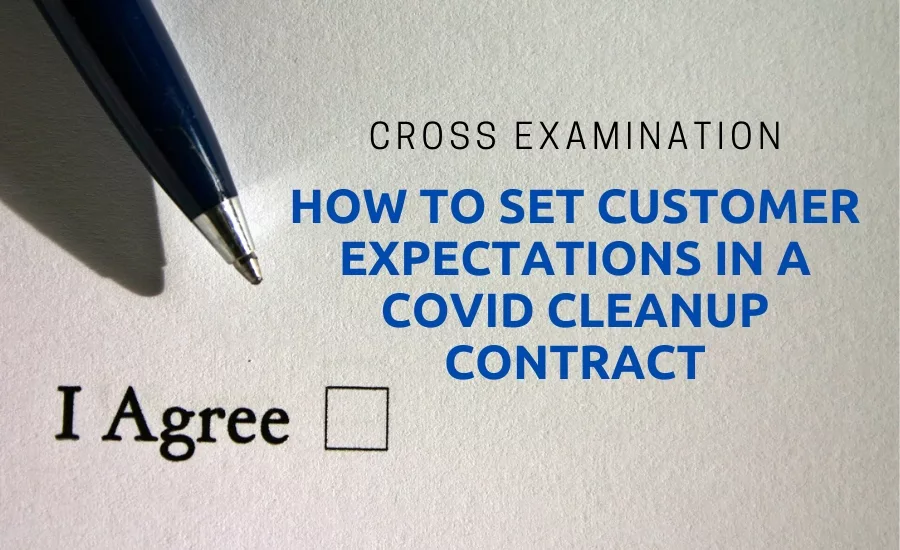Cross Examination
How to Set Customer Expectations In a COVID Cleanup Contract

In her Inc. Magazine article, Why ‘Under Promise and Over Deliver’ is Terrible Advice, Jessica Stillman describes some interesting studies that revealed there’s no payoff in going above and beyond when delivering service to customers. She explains that once we receive a promise, we strongly expect it to be met, but do not in any way anticipate that it will be exceeded, and that doing more than what we say we will do is unlikely to win us additional points. She offers blue sky by saying that small business owners can save lots of time and money by not wasting efforts over-delivering.
But what is the expectation of a customer who hires a professional to address the deadly coronavirus in a building and people’s lives and livelihoods are at stake? If the presentation and the contract are not clear and precise, the customer is likely to expect that the building will be “coronavirus-free” when the job is done. The public sees television commercials about EPA-registered products that allegedly continue to kill germs for days or weeks after application. They incorrectly assume that EPA “registered” means EPA “approved.” The Clorox web site says its disinfecting wipes “kill” 99.9% of human coronavirus. It’s no wonder customers have high expectations when they pay thousands of dollars for cleaning by specially-trained professionals.
If there was ever a time to under promise, this pandemic is it.
Over-delivering is the least of our problems. Can you prove the effectiveness of your coronavirus cleanup or preventative cleaning at all? If not, does the Golden Rule require disclosure of that fact? Good business sense dictates that anything worth disclosing in a high stakes situation should be disclosed in a writing signed by both parties, i.e., the contract.
The scope of work in a coronavirus cleanup contract should tamp down the expectations of the customer. Professional cleaners set themselves up for conflict and potential legal trouble if they fail to properly frame the discussion from the beginning. They can explain the realistic goals of the work and win over the customer by exuding common sense and candor with an honest admission about their true goals with the work. They can explain that the goal of the work is to mitigate the transmission of the virus––not eliminate it, and then write those words into the coronavirus cleanup contract. The contract should describe the steps to be performed in the work but state that there is no warranty as to the specific outcome of those steps.
If the cleaner is not prepared to testify in court that viruses were completely removed from a structure, then the initial verbal presentation and the contract should not suggest otherwise.
The parties need to reach an agreement as to how the success of the project will be determined, and it should be stated clearly and explicitly in the written contract. This is why the traditional restoration work authorization that says the provider will “return the property to its pre-loss condition” is fraught with peril. It will subject the provider to serious legal and financial ramifications when the coronavirus is involved. The “loss” will be interpreted to mean coronavirus contamination, so returning the property to pre-loss condition will be interpreted to essentially mean the coronavirus will be completely removed. Do not assume customers understand. Tell them, and then confirm it in the contract, keeping in mind that ambiguities in contracts are construed against the drafter.
A judge and jury won’t care about fancy technical explanations as to why complete removal is scientifically unrealistic. Instead, the focus will be on what was promised in the presentation and the written contract, because those things sets the expectations. Then the promises will simply be compared to what was delivered, and if there is any discrepancy between the two, it will be time for the service provider to take out the checkbook.
So whether I am drafting a mold remediation contract or a coronavirus contract, I am always careful to explicitly describe the goals of the work. I urge my clients to tell their customers exactly how they can judge the success of the work, and then to confirm that in the written contract, signed by the customer before any work begins. For mold remediation contracts, we can reference the success criteria set forth in the ACGIH publication, Bioaerosols: Assessment and Control. There is no counterpart when it comes to coronavirus, so great care must be used to safely and fairly manage the customer’s expectations. Therefore, a coronavirus cleanup contract should explicitly disclaim warranties. Most restoration contracts do not disclaim warranties, so coronavirus is complex enough––and dangerous enough––to warrant a specially-drafted contract.
Unlike mold, coronavirus cannot be seen, smelled, or photographed, and coronavirus cleanup work is rarely done with the benefit of any sort of pre- or post-testing. So as far as the virus is concerned, we often don’t know what we started with and we usually don’t know exactly what we accomplished. The safe and sensible solution is to promise and deliver a carefully-conceived protocol that is in harmony with the RIA/IICRC Report on the COVID-19 Pandemic. The presentation and the contract should explain that the project will be a success when the steps stated in the protocol have been completed––and avoid any reference whatsoever to “pre-loss condition.” That success can be proven with photography and videography of the work in progress, detailed job logs, records of materials used, and so on. Documentation is more important than ever, and the quality of it remains remarkably poor and antiquated in many restoration companies.
In a collection case, the restorer has the burden of proving the work was performed. The job file should explain who did what, when it was done and why. Don’t take anything for granted when it comes to documentation.
I long for a time when I can go a whole week without having to break the bad news to a restorer that another invoice is in jeopardy due to a failure of rudimentary documentation. Please save me from further grief. No need to over-deliver, just use a good COVID-specific contract, set reasonable expectations with the customer, and then:
Document.
Document.
Document.
CLICK HERE to download Ed's video: 2 Minute Crash Course on How to Set Customer Expectations in COVID Cleanup Contracts.
Looking for a reprint of this article?
From high-res PDFs to custom plaques, order your copy today!






